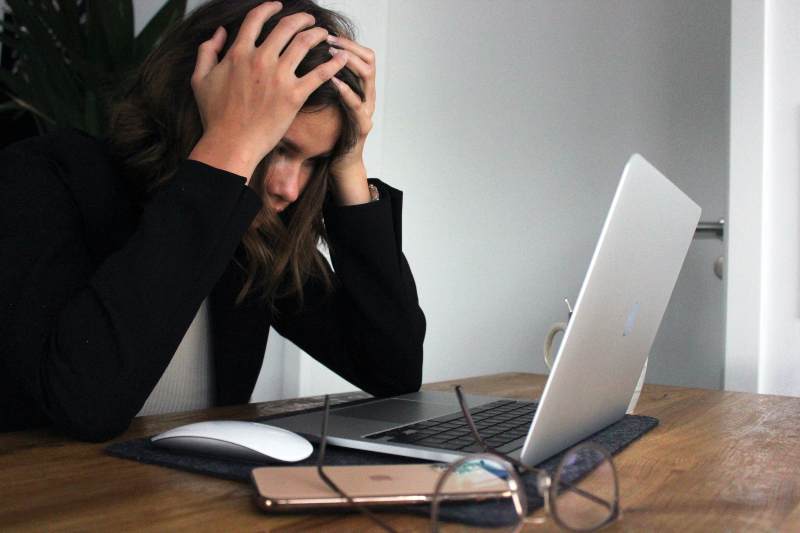Disclosure: This page may contain affiliate links, meaning we receive a commission if you decide to make a purchase through our links, but this is at no additional cost to you. Please read our disclosure and privacy statement for more info.
Many night shift jobs are found in highly stressed industries. Add in the disruption to your circadian rhythm and that stress can grow into more serious health complications, one of which can be anxiety.
For some, night shift can be the compounding factor in developing anxiety. This is mainly due to insufficient sleep, feelings of isolation, a high-pressure working environment, and increased workplace safety risks. Identifying and analyzing the triggers will help combat anxiety levels.
Workplace anxiety can occur in any field of work, regardless of the difficulty of the job or working nights. In addition, there are a number of factors that will elicit anxiousness on the job that can accumulate into developing workplace anxiety. So we want to help you understand exactly what workplace anxiety can look like, and how to manage it should you see factors below that suggest you are going down this path.
What is Workplace Anxiety?
When the thought of going to work makes you feel nervous or anxious beyond those first-day jitters, you may have workplace anxiety. Your workplace may be causing anxiety if you feel more dread than joy when you think about having to go to work. Feeling anxious about going to work will impact a number of things.
- Your mood changes drastically when you realize you have to go to work
- You may become angry or overreact to minor events
- Being at work increases your level of anxiety leading to being easily agitated or overly worrisome
Symptoms of Workplace Anxiety
- You feel ill whenever thinking about work or hearing from your job via emails, texts, or phone calls
- You feel better immediately after your shift is over and you feel at your worst right before going to work
- You experience an increased lack of motivation to complete work-related tasks and put off work assignments until the last minute
- You have trouble concentrating on tasks or feel overwhelmed with doubt about what you’re supposed to do or your ability to do it.
- You miss meetings, decline to take on new or unfamiliar tasks, or avoid attending work-sponsored events.
- Physical symptoms include
- tension and pain in your neck, shoulders, and back
- headaches
- stiff muscles and body aches
- stomach aches and feelings of nausea

What Leads to Workplace Anxiety?
Your work environment plays a significant role in whether or not you will develop workplace anxiety. High-stress jobs in the medical field, fire, and rescue, as well as working as a police officer can lead to workplace anxiety. This may be due in part to an elevated fear of death due to the lethality of the work you do.
In addition, jobs that pose a higher risk to your safety, such as pilots, truck drivers, and factory workers, are known to elicit workplace anxiety. Jobs working with hazardous materials or performing tasks in precarious situations can also lead to the development of workplace anxiety. Your fear of becoming severely injured or killed on the job could grow into a constant worry if not addressed.
As a night shift worker, workplace anxiety often stems from feeling isolated from your support system at work. Generally, there are fewer senior staff members available to assist you in the event you need help. Plus, there are typically fewer people working night shifts which puts more responsibility on your shoulders and more worries on your mind. (source)
Feeling isolated from your family and friends can also contribute to the development of workplace anxiety. You may experience feeling guilty for having to miss out on birthdays, family events, and socializing. Having less face-to-face time with loved ones limits your ability to talk about your problems.

Factors That Generate Workplace Anxiety
Your experience at work influences whether or not you will develop workplace anxiety. There are a number of factors in your work environment that can increase your risk. Being able to address these elements of your job will likely reduce your feelings of anxiety.
- You work in a highly competitive environment with low levels of incentive. Teamwork doesn’t exist when everyone is trying to outdo their co-workers. Anxiety is a common symptom of intense workplace competition.
- You don’t have enough self-confidence to believe you are capable of doing the job expected of you. This is referred to as imposter syndrome (source). Anxiety develops from this factor because you’re fearful of making a mistake that would prove you’re a phony.
- You have poor relationships with your co-workers or you feel like you’re being excluded from the group. You feel like an outsider or have trouble connecting with them on a personal level. These exclusionary feelings can make you feel unwelcome at work and lead to dreading each shift.
- You work in a hostile environment with a formidable boss or supervisor. They treat you poorly and criticize your performance rather than offer assistance when they see you’re struggling. They show little regard for their employees’ well-being and provide little help.
- You begin to feel like the work you do has no use or a sense that your job is meaningless. You worry that what you do at work is insignificant and unnecessary. This can lead to worries about being replaced, laid off, or fired. (source)
- You’re thrown into the job without adequate training on how to do assigned tasks. Your boss requests you to perform jobs that you are not prepared to do. Your co-workers offer little assistance when you ask for their help.
- You work for a company that sets unattainable goals for its employees that negatively impact the confidence of your skill level. They scold you for minor infractions in a condescending manner. Your performance suffers from constantly second-guessing how well you’re doing. (source)

What Exactly is Anxiety?
Anxiety is a typical reaction to something unexpected or unwanted. It is different from fear, however. It is worrying about possible scenarios that may or may not occur to the point of interfering with your daily life. Anxiety has a greater intensity than fear because it is an irrational anticipation of an event becoming catastrophic without any evidence of the fact.
Symptoms of anxiety include
| a rapid heartbeat (just a brief duration but may occur frequently throughout your day) | pupils of your eyes will dilate from the excess hormones released in a reflexive action of survival |
| spike in blood pressure | tightening of the skeletal muscles in preparation to battle or flee from the stressor |
| sudden perspiration followed by clammy skin | increased respiration rate to take in more oxygen for improved thinking speed and reaction time |
| reduction of activity in the digestive system as the body diverts attention to your fight or flight response | inability to stay on task or concentrate on what’s happening in the present |
| may induce nightmares and cause frequent wakings from sleep | disruptions to sleep patterns making it difficult to quiet the mind and fall asleep |
When you combine the physical symptoms of anxiety with the mental strain, it’s no wonder people who experience anxiety feel fatigued. Constant worry becomes detrimental to your health and overall well-being. Over an extended period of time, it will begin to negatively impact your relationships at work, at home, and among friends.

Ways to Manage Workplace Anxiety
Managing your workplace anxiety begins with identifying what triggers these feelings. This will help you to pinpoint where your irrational fear stems from. By understanding what is causing you to feel anxious about your job, you will be better equipped to formulate a plan to combat the anxiety.
Name the what-ifs that scare you into feeling anxious about work. What is it about each one that makes you fearful? What is the meaning behind the feelings of anxiety?
Analyze each situation and define why they are bad. Evaluate the likeliness of each one occurring while making a plan for how you should react. By addressing your worst-case scenarios head-on, you can determine what actions you can take to avert your imagined disaster.
As you look at each situation, think about what evidence exists that the scenario will happen versus the evidence that it won’t happen. What would you tell a loved one who was facing the situation? If the worst-case scenario does happen, what coping tools and support systems do you have available to help you recover?
What does the best-case scenario look like in comparison to your imagined disaster? Is there evidence that it is more likely to occur? What steps can you take to be closer to your best-case scenario rather than the worst?
Stress and anxiety lead to being overly critical of yourself. Verbalize your feelings and reassure yourself that it’s okay to not feel okay. Rationalize your feelings by focusing on the positive steps you’re taking to do your job well.
Find ways to take a break to clear your mind and reset your stress levels. Deep breathing and countdown exercises can help you become recentered. Short bursts of physical exercises, like jumping jacks, jumping rope or jogging in place will release endorphins that can improve your mood, energy levels, and motivation.
If you find that large projects feel overwhelming, create a breakdown schedule of more manageable smaller tasks. Set realistic deadlines for each task to ensure the project is completed on time. You will be better able to focus by concentrating on each step rather than fretting over the entire job at hand.
Another important step you can take to help manage workplace anxiety is to establish healthy boundaries. Speak with supervisors about creating a regular work schedule to avoid pop-up surprise shifts or changes that leave you little time to mentally prepare for the job.
Balance your work with time devoted to your health and wellness and be sure to include time for socializing. Speak up about tasks you’re not comfortable performing and behaviors of others you are unwilling to tolerate.

Best Treatment for Anxiety
If you continue to struggle with managing your workplace anxiety, you should consider seeking the help of a professional.
Cognitive behavioral therapy (CBT) has proven to be an effective form of treatment for anxiety disorders. Therapists use this method to help you change your way of thinking and modify your behaviors to reduce your feelings of anxiety.
Cognitive behavioral therapy works on the I think therefore I am principle. When your brain tells you something often enough, you begin to believe it to be true. If you think you’re a failure then you are more likely to fail. But if you tell yourself you have the skill, knowledge, or talent to do X, Y, and Z then you’ll have a greater chance at succeeding.
If you’re new to the idea of CBT, this workplace is the ideal place to start. Here is the link on Amazon to take a closer look.


Other things you can do to reduce your workplace anxiety include;
- daily exercise routine, yoga, meditation, deep breathing, and healthy eating habits to improve the mind and body connection. Adult colouring in books are worth a look too.
- avoid alcohol and cigarettes as they tend to make matters worse rather than better
- try something new that will take your mind of the stressors where you may even discover a new talent, learn something interesting, and expand your knowledge
- Wear an anti-anxiety ring to allow you to fidget with something which doesn’t distract the entire room.


- herbal remedies, such as magnesium, antioxidants, and amino acids, have been helpful for some individuals to alleviate symptoms
- journaling can be an effective way for you to sort through your feelings, identify your worries, and make action plans for how to handle different situations you may encounter at work
- balance your time by creating a routine that keeps you busy without being overworked that limits your idle time when negative thoughts have a tendency to creep up on you
- staying organized helps you keep track of tasks and save time for self-care (and here’s a guide for doctors)
- Surround yourself with motivational reminders such as this bracelet from Amazon


- Getting ample sleep. This may seem like a crazy idea for night shift workers but it doesn’t make it impossible or at least something to work towards. Our video below can be a great help.
Workplace anxiety may not be fully recognized by the general public yet but don’t let that be a reason for keeping it all inside. The more you talk about what’s going on and the struggles you are experiencing, the better people will be to help you. And if you find that the job you have is just too much to handle, it’s always best to look out for number one!
Cheers,

Disclosure: This page may contain affiliate links, meaning we receive a commission if you decide to make a purchase through our links, but this is at no additional cost to you. Please read our disclosure and privacy statement for more info.

Recent Posts
Stress management techniques are an essential asset for every night shift worker. Your night shift job puts added strain on your health and mental well-being. Knowing ways to lower your feelings of...
Fellow shift workers, we need to have an honest discussion about night shift and depression. While some of us thrive on a night shift schedule, there are also those among us who are not exactly...

